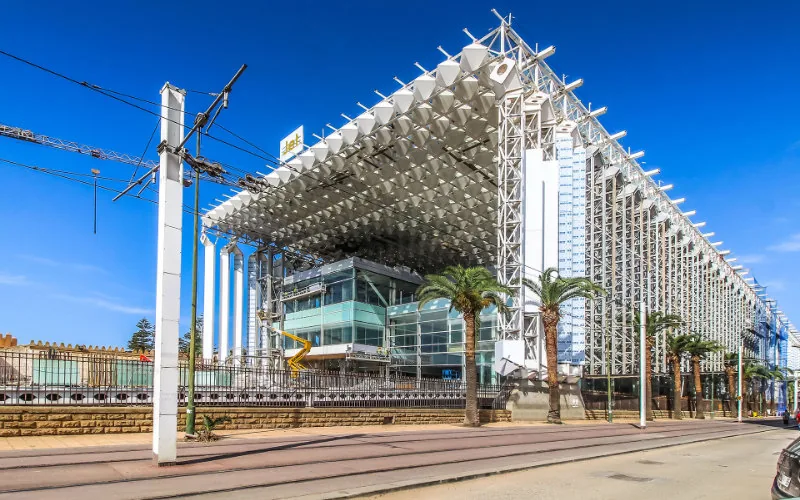Morocco Invests Billions in Infrastructure for 2030 World Cup Co-Hosting

Morocco has unlocked massive investments for the 2030 FIFA World Cup, which it will co-host with Spain and Portugal. Will the socio-economic benefits be lasting and commensurate with the investments?
Extension works on the high-speed rail line (LGV) between Kenitra and Marrakech (430 kilometers), financed to the tune of 53 billion dirhams, excluding rolling stock to complete the existing line between Tangier and Casablanca inaugurated in 2018; construction of the Hassan II Stadium with a planned capacity of 115,000 seats, for an estimated budget of 5 billion dirhams; investments between 500 million and 4 billion dirhams planned for airports, highways, hospitals and other public infrastructure, raising of a 2 billion euro bond loan in March 2025... Morocco is gearing up for the co-organization of the 2030 World Cup. That’s not all.
According to Atlas Capital, the Treasury will mobilize 25 billion dirhams for the construction of stadiums and training centers. In total, 17 billion dirhams will come from bank financing or private debt. On the hotel side, nearly 200 new hotel establishments should be built by 2030, for an additional capacity of about 15,000 rooms. Morocco’s participation in the organization budget should be between 5 and 6 billion dollars, of which more than half will be dedicated to stadiums and transport infrastructure, according to Sogécapital Gestion.
These projects could transform both large cities and secondary urban centers, estimates Mohamed Mahboub, president of the National Federation of Building and Public Works (FNBTP), quoted by Jeune Afrique. What about the socio-economic benefits for Morocco? The Budget Minister, Fouzi Lekjaâ, president of the Royal Moroccan Football Federation (FRMF), and also president of the organizing committee for the 2030 World Cup, "evokes a lever of international influence through soft power." Morocco expects to welcome 26 million tourists in 2030, compared to 17.4 million in 2024, for tourism revenues estimated between 2 and 3 billion euros.
According to the Observatory of Government Work (Otrago), the organization of the World Cup could generate overall economic benefits of 8 to 10 billion dollars. Atlas Capital anticipates an increase in Moroccan GDP of 1 to 2.5 points and the creation of 130,000 to 160,000 jobs. Other sectors such as the railway industry could also benefit from this dynamic. For Jeune Afrique, the question of the legacy of infrastructure remains, with several studies, including that of BSI Economics, concluding that investments related to World Cups in South Africa and Brazil have generated losses or underutilized infrastructure. It is therefore recommended that Morocco design multifunctional stadiums, capable of hosting cultural or sporting events beyond football.
Related Articles
-

Morocco Cracks Down on Illegal Construction: Major Cities Face Scrutiny Amid Urban Planning Scandal
6 September 2025
-

Moroccan Police Bust International Phone Theft Ring: France-Morocco Sting Recovers Stolen Devices
6 September 2025
-

US Reaffirms Support for Moroccan Sovereignty in Western Sahara Dispute
6 September 2025
-

Severe Weather Alert: Moroccan Regions Brace for Intense Thunderstorms and Heavy Rainfall
6 September 2025
-

Quebec’s International Student Crisis: UQAM Faces 39% Drop as Government Policies Spark Global Concern
5 September 2025